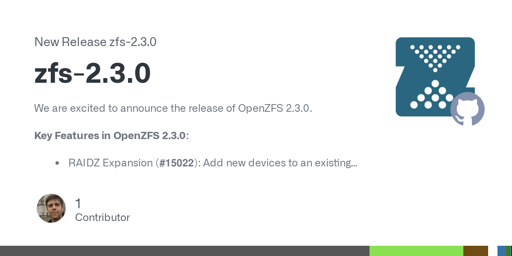Key Features in OpenZFS 2.3.0:
- RAIDZ Expansion (#15022): Add new devices to an existing RAIDZ pool, increasing storage capacity without downtime.
- Fast Dedup (#15896): A major performance upgrade to the original OpenZFS deduplication functionality.
- Direct IO (#10018): Allows bypassing the ARC for reads/writes, improving performance in scenarios like NVMe devices where caching may hinder efficiency.
- JSON (#16217): Optional JSON output for the most used commands.
- Long names (#15921): Support for file and directory names up to 1023 characters.
- Bug Fixes: A series of critical bug fixes addressing issues reported in previous versions.
- Numerous performance improvements throughout the code base.
- Supported Platforms:
- Linux kernels 4.18 - 6.12,
- FreeBSD releases 13.3, 14.0 - 14.2.
Finally! #15022, it’s been a long time coming…
I literally just got bigger drives for my array last week. So happy I put it off.
So did I, yesterday, but I still think I have to rebuild because I’m reducing disk quantities :(
Also, note that doesn’t increase the stripe size for old data; it’s just for future writes.
But you could copy the old data to a new location and it would take advantage of the new stripe size.
How does it work before this release?
It used to be that you couldn’t grow the pool, so you needed all of your drives up-front.
Now you can start with four drives and slowly grow over time to whatever your target goal is. It’s much more friendly for home labs/tight budgets.
That’s good to hear. I assume people saying “ZFS” are usually referring to this OpenZFS (and usually not Oracle ZFS)?
Oracle ZFS is so obscure by now that it’s irrelevant.
As usual with Oracle products, it’s just a means to squeeze poorly led companies.
I like JSON output. Will make my monitoring jobs less fragile.
Super excited to see the expansion functionality released!
Will 1023 byte filename break software? Most only support 256.
Wasn’t raidz expansion already in a tagged version or did I miss remember?






